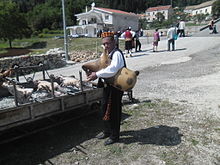Diple
The diple ('the double' from ancient Greek διπλοῦς diplous ' zwiefach , double') is a traditional wind instrument that is widespread in Croatia (especially Dalmatia ) and Bosnia-Herzegovina .
Diple is either a double reed instrument with two parallel melody tubes and two simple reeds , which are held in a cup-shaped wind capsule , similar to the Istrian ursle . Or the name refers to a bagpipe without a cord , in which the diple is used as a "chanter". The Diple have the characteristic, penetrating sound of the double reed instruments such as Alboka or Midschwiz .
The dvojnice , a double recorder with two V-shaped diverging music tubes, can also be called a diple.
Diple without a windsock
The two melody tubes of the Diple are drilled parallel into a straight piece of wood. The sound is produced by two idioglotte reeds. The right tube has six finger holes on the top. The holes in the left pipe are at the same level, their number varies regionally. There are different combinations (6: 6, 6: 0, 6: 2, mostly 6: 3). The fingers overlap both melody tubes, three fingers from each hand. Depending on the arrangement of the finger holes, the instrument sounds with drone or step drapery, sometimes with two or one voices. There are also forms with only one melody tube.
The play tubes and the wind capsule are usually richly decorated with burnt or carved ornaments.
Diple as a bagpipe
In connection with a windsock, Diple refers not only to the play tube, but to the bagpipe as a whole. Apart from the diple, the bagpipe consists only of a turned blow pipe and the bellows of a sheep or a goat (possibly with decorative additions).
Bagpipes of this type are known as diple, especially in Dalmatia and the Zagora . On the island of Korcula they are called 'Misnice', on the peninsula of Peljesac 'Mejsnice' and on the Adriatic islands and in Istria they are called Mih .
Individual evidence
- ↑ a b Stephen Večković on gajde.com , accessed on May 16, 2009
- ↑ Components of a Mih , accessed on May 16, 2009
- ↑ Stephen Večković on Dvojnice , accessed on May 16, 2009
- ↑ a b Josko Caleta in Trends and Processes in the Music Culture of the Dalmatian Hinterland ( Memento of the original dated December 31, 2008 in the Internet Archive ) Info: The archive link was inserted automatically and has not yet been checked. Please check the original and archive link according to the instructions and then remove this notice. , accessed May 16, 2009
Web links
- Video of a double player without a windsock , accessed May 16, 2009
- Overview of Croatian wind instruments (Croatian), accessed on May 16, 2009
- Description of the Diple, accessed May 16, 2009
- Description, illustration, audio sample (in French), accessed on May 16, 2009
